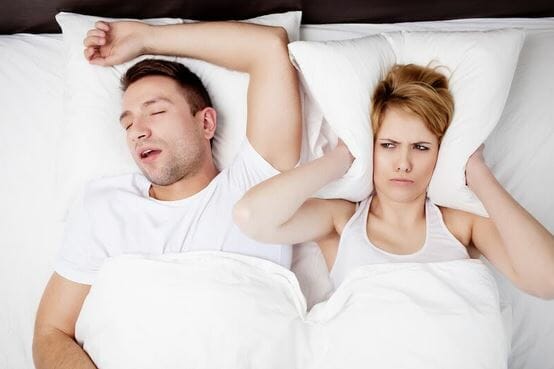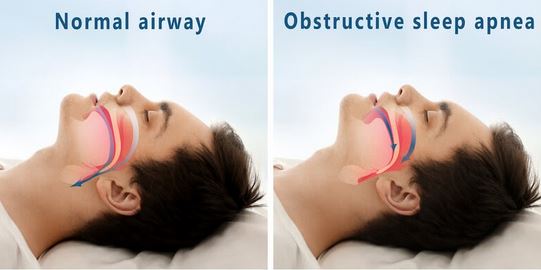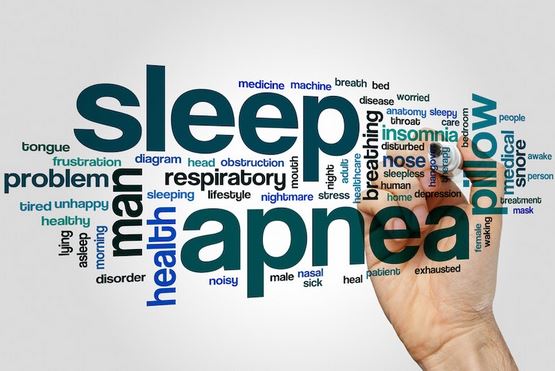You came in for your annual dental check-up, and the dentist makes a comment that it looks like you’ve been grinding your teeth. Followed by asking if you snore at night? Which instantly makes you wonder, “have you been talking to my spouse?” The dentist then goes on to tell you that those two things can actually be caused by sleep apnea.
Sleep apnea is a condition that can easily go undetected, but your mouth and teeth can tell a different story.
To find out more information about sleep apnea, risk factors, symptoms of sleep apnea,and how sleep apnea can be treated by your local dentist Dr. Feng, continue reading to learn more.

Surprisingly, many people suffer from sleep apnea; men are affected more often than women. Signs of sleep apnea would include:
– Loud snoring
– Episodes where you stop breathing during sleep — which would be reported by another person
– Gasping for air while sleeping
– Waking up with a dry mouth
– Morning headaches
– Difficulty staying asleep (insomnia)
– Excessive daytime sleepiness (hypersomnia)
– Difficulty paying attention while awake
– Irritability
– Grinding (Bruxism) or Clenching of the teeth while sleeping
Dentists are often the first to diagnose a sleep disorder since the first sign of sleep apnea is oftentimes tooth grinding (also called bruxism). While sleeping, if you grind your teeth or tense your jaw muscles, it sends a message to your brain that you need to wake up to breathe.
Teeth grinding is one oral sign of sleep apnea. Other oral signs would include a tongue with scalloped edges, jaw pain, or redness in the throat (caused by snoring a lot, another symptom of sleep apnea).
While sleeping, the disorder can cause you to gasp for air, waking you up repeatedly, which diminishes your sleep quality and causes fatigue. Also, sleep apnea is linked to a higher risk of high blood pressure, heart disease, diabetes, and obesity.

Sleep apnea is caused by one of two types of sleeping disorders.
– Obstructive sleep apnea
– Central sleep apnea
Let’s take a look at these a little closer.
Obstructive Sleep Apnea
Obstructive sleep apnea happens when the muscles located in the back of your throat relax and cause the airway to narrow or close as you breathe, resulting in less air and lowering the blood’s oxygen level. The brain then senses your inability to breathe and briefly wakes you from sleep to reopen your airway. And this can be so brief that usually you don’t remember waking up. You may even snort, choke, or gasp. This pattern can repeat itself five-30 times or more each hour throughout the night and impairs your ability to reach a deep, restful phase of sleep.
Central Sleep Apnea
This form of sleep apnea is less common and occurs when your brain fails to send signals to your breathing muscles, which results in making no effort to breathe for a short time. This form of sleep apnea can cause you to wake with shortness of breath or have a hard time getting to sleep or staying asleep.

Sleep apnea can affect anyone, including children. But certain risk factors increase the probability of having sleep apnea.
Obstructive Sleep Apnea Risk Factors:
– Excess weight. Obesity dramatically increases the risk of having sleep apnea. The reason being- fat deposits around the upper airway can obstruct breathing.
– Neck circumference. People with thicker necks might have more narrow airways.
– A narrowed airway. You may have inherited a narrow throat. Tonsils or adenoids also can enlarge, which can block the airway, often seen in children.
– Being male. Men are two to three times more likely to have sleep apnea than women. However, women can increase their risk after menopause and if they’re overweight.
– Being older. Age can increase your risk for sleep apnea and has been seen to occur more often in older adults.
– Family history. Your sleep apnea may be hereditary or increase your risk if anyone else in the family has it.
– Use of alcohol, sedatives, or tranquilizers. These types of substances can relax the muscles in your throat, causing obstructive sleep apnea to worsen.
– Smoking. People who smoke are three times more likely to have obstructive sleep apnea than people who’ve never smoked before. This is caused by an increase in fluid retention and inflammation in the upper airway from smoking.
– Nasal congestion. Difficulty breathing through your nose — either from allergies or an anatomical problem — have a risk of developing obstructive sleep apnea.
– Medical conditions. High blood pressure, congestive heart failure, Parkinson’s disease, and type 2 diabetes are some medical conditions that may increase your chances of having obstructive sleep apnea. Hormonal disorders, polycystic ovary syndrome, chronic lung diseases such as asthma, and prior strokes also can increase your risk.
Central Sleep Apnea Risk Factors:
– Being older. People who are middle-aged or older are at higher risk of having central sleep apnea.
– Being male. Men are at higher risk of having central sleep apnea than women.
– Heart disorders. Congestive heart failure increases the risk of having central sleep apnea.
– Using narcotic pain medications. Opioid medications, in particular, long-acting ones like methadone, increase the risk.
Stroke. History of stroke increases your risk of central sleep apnea or treatment-emergent central sleep apnea.
Absolutely! Dentists can help with sleep apnea and are trained to look for oral abnormalities in the mouth, and usually are the first to discover you could have a sleeping disorder. The next step, when Dr. Feng thinks someone has sleep apnea, she will often recommend a sleep study. (Although dentists have in-depth dental knowledge about symptoms and treatments, only a medical doctor can make an official sleep apnea diagnosis.) Once a definitive diagnosis is made and determined what type of sleep apnea you have, Dr Feng can offer an oral appliance or NightLase® therapy to treat your mild to moderate sleep condition.
To be a candidate for sleep apnea dental treatment, you must be diagnosed with mild to moderate sleep apnea. Once you’ve been diagnosed by a sleep specialist with mild to moderate sleep apnea, you can talk to your local dentist about oral therapy treatment options.
Dr. Feng offers patients two sleep apnea treatment options available at her Fairview, TX dental office.
Oral Sleep Apnea Appliance
Sleep apnea can be treated by an oral dental device that is worn while sleeping. The appliance is custom made to fit your teeth and positions the lower jaw forward while sleeping, which allows the tissues to relax at the back of your throat. Also, ensuring the base of your tongue doesn’t collapse and block your airway, giving you a safe and soundless sleep. Most patients prefer oral appliance therapy to treat their sleep apnea for comfort, convenience, and effectiveness.
NightLase® Therapy
Since Sloan Creek Dental is a state of the art laser-equipped office, Dr. Feng can also offer her patients laser therapy to treat sleep apnea. Dr. Feng uses Fotona’s NightLase® therapy- a non-invasive, patient-friendly laser treatment that increases your sleep quality. Doing NightLase® therapy will reduce the effects of sleep apnea and decrease the amount of snoring by using a gentle, laser-induced tightening treatment to contraction the collagen in the oral tissue. It’s a pleasant and easy way for you to regain a good night’s rest. NightLase® therapy consists of three separate treatment sessions over six weeks. The treatment’s final results have been shown to last up to a year, and the laser therapy can be repeated. Furthermore, the great thing about NightLase® is that it requires no device to be worn during sleep and involves no chemical treatment.
If you think you are experiencing any of the sleep apnea symptoms or want to talk about treatment options for your mild to moderate sleep apnea, Dr. Feng is here to help! Sleep apnea is a pretty serious medical condition that should not go untreated. Be sure to mention at your next dental appointment or medical visit if you’re showing any signs of a sleep disorder.
Dr. Feng would be happy to evaluate your symptoms, direct you in what your next steps should be, and go over treatment options that are offered at (insert dental office name, anchor to the homepage) for sleep apnea.
Besides seeing you to treat sleep apnea, Dr. Feng also offers laser teeth whitening, dental implants, preventive, restorative and cosmetic dental care as well as many more laser treatments options.
Feel free to schedule an appointment today at our Fairview dental office to get started creating a bright and healthy smile!
We firmly believe that the internet should be available and accessible to anyone, and are committed to providing a website that is accessible to the widest possible audience, regardless of circumstance and ability.
To fulfill this, we aim to adhere as strictly as possible to the World Wide Web Consortium’s (W3C) Web Content Accessibility Guidelines 2.1 (WCAG 2.1) at the AA level. These guidelines explain how to make web content accessible to people with a wide array of disabilities. Complying with those guidelines helps us ensure that the website is accessible to all people: blind people, people with motor impairments, visual impairment, cognitive disabilities, and more.
This website utilizes various technologies that are meant to make it as accessible as possible at all times. We utilize an accessibility interface that allows persons with specific disabilities to adjust the website’s UI (user interface) and design it to their personal needs.
Additionally, the website utilizes an AI-based application that runs in the background and optimizes its accessibility level constantly. This application remediates the website’s HTML, adapts Its functionality and behavior for screen-readers used by the blind users, and for keyboard functions used by individuals with motor impairments.
If you’ve found a malfunction or have ideas for improvement, we’ll be happy to hear from you. You can reach out to the website’s operators by using the following email
Our website implements the ARIA attributes (Accessible Rich Internet Applications) technique, alongside various different behavioral changes, to ensure blind users visiting with screen-readers are able to read, comprehend, and enjoy the website’s functions. As soon as a user with a screen-reader enters your site, they immediately receive a prompt to enter the Screen-Reader Profile so they can browse and operate your site effectively. Here’s how our website covers some of the most important screen-reader requirements, alongside console screenshots of code examples:
Screen-reader optimization: we run a background process that learns the website’s components from top to bottom, to ensure ongoing compliance even when updating the website. In this process, we provide screen-readers with meaningful data using the ARIA set of attributes. For example, we provide accurate form labels; descriptions for actionable icons (social media icons, search icons, cart icons, etc.); validation guidance for form inputs; element roles such as buttons, menus, modal dialogues (popups), and others. Additionally, the background process scans all of the website’s images and provides an accurate and meaningful image-object-recognition-based description as an ALT (alternate text) tag for images that are not described. It will also extract texts that are embedded within the image, using an OCR (optical character recognition) technology. To turn on screen-reader adjustments at any time, users need only to press the Alt+1 keyboard combination. Screen-reader users also get automatic announcements to turn the Screen-reader mode on as soon as they enter the website.
These adjustments are compatible with all popular screen readers, including JAWS and NVDA.
Keyboard navigation optimization: The background process also adjusts the website’s HTML, and adds various behaviors using JavaScript code to make the website operable by the keyboard. This includes the ability to navigate the website using the Tab and Shift+Tab keys, operate dropdowns with the arrow keys, close them with Esc, trigger buttons and links using the Enter key, navigate between radio and checkbox elements using the arrow keys, and fill them in with the Spacebar or Enter key.Additionally, keyboard users will find quick-navigation and content-skip menus, available at any time by clicking Alt+1, or as the first elements of the site while navigating with the keyboard. The background process also handles triggered popups by moving the keyboard focus towards them as soon as they appear, and not allow the focus drift outside of it.
Users can also use shortcuts such as “M” (menus), “H” (headings), “F” (forms), “B” (buttons), and “G” (graphics) to jump to specific elements.
We aim to support the widest array of browsers and assistive technologies as possible, so our users can choose the best fitting tools for them, with as few limitations as possible. Therefore, we have worked very hard to be able to support all major systems that comprise over 95% of the user market share including Google Chrome, Mozilla Firefox, Apple Safari, Opera and Microsoft Edge, JAWS and NVDA (screen readers), both for Windows and for MAC users.
Despite our very best efforts to allow anybody to adjust the website to their needs, there may still be pages or sections that are not fully accessible, are in the process of becoming accessible, or are lacking an adequate technological solution to make them accessible. Still, we are continually improving our accessibility, adding, updating and improving its options and features, and developing and adopting new technologies. All this is meant to reach the optimal level of accessibility, following technological advancements. For any assistance, please reach out to